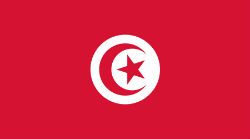The Tunisian legal system is influenced by French Civil Law, while the Law of Personal Status is based on Islamic Law.
Country overview
Population
12,139,095m
President
Kaïs Saïed
Capital city
Tunis (2,658,816m)
Other major cities
Sfax (1,018,341 m)
Sousse (0.84m)
Major industries
IT, textile, agriculture, agro-business, pharmaceutical industry, electrical and electronic industries, automotive, tourism, oil and gas and mining
Currency
Tunisian Dinar
Languages
Arabic and French
Major religions
Islam
Legal information
- Capital markets
Exchange
Tunisia Stock Exchange (BVMT)
Corporate Governance Code
Commercial Companies' code
Current number of listed companies
81
Regulatory body or bodies
Tunisia Stock Exchange (BVMT)
Council of Financial Markets (CMF)
Main legislation
- Law No.94-117 dated 14/11/1994 reorganising the Financial Market General Rules of the Stock Exchange
- General regulations of the Stock Exchange
Public offers / disclosure regulations
Rule of the Council of Financial Markets Council related to Public Offers
Takeover / merger regulations
- Commercial compagnies code
- Law No. 94-117 dated 14/11/1994 reorganising the Financial Market General Rules of the Stock Exchange
- Law No. 2015-36 dated 15/09/2015 related to reorganisation of competition and prices.
- Competition Regulation
- Law No. 2015-36 of September 15, 2015, reorganizing competition and prices
- Corruption / transparency
Corruption Perception Index rank worldwide for 2021
70
Corruption Perception Index score for 2022
40
Signatories to United Nations Convention Against Corruption (UNAC)?
Tunisia signed the United Nations Convention against Corruption on 30 March 2004 and ratified it on 24 March 2008. Tunisia deposited its instrument of ratification with the Secretary-General on 23 September 2008.
Signatories to the OECD Convention on Combating Bribery of Foreign Public Officials in International Business Transactions?
No
- Disputes
Arbitration
Law No. 93-42 of April 26, 1993 promulgating the Arbitration Code as amended by subsequent texts.
Enforcement of arbitral awards
Arbitral awards rendered abroad are enforceable in Tunisia through exequatur procedure in accordance with the provisions of Title 8 of the Tunisian code of arbitration.
Enforcement of foreign judgments
Foreign judgments can be enforced in Tunisia through exequatur procedure according to the provisions of Title 3 of the Tunisian code of international private Law.
Structure of the court system
The Tunisian court system includes:
- Court of First Instance
- Court of Appeal
- Court of Cassation
- Real Estate Court
- Administrative Court
- Foreign investments
Foreign investments
- Law No. 76-18 of January 21, 1976 reorganizing and codifying the exchange and foreign trade legislation governing relations between Tunisia and foreign countries as amended by law No. 93-48 of May 3, 1993 and law No. 94-41 of March 7, 1994 on foreign trade and the various circulars and notices of the Central Bank of Tunisia.
- Law No. 2016-71 of September 30, 2016, on the investment law.
- Law No. 2019-47 of May 29, 2019 on improving the investment climate.
- Decree-Law No. 2022-68 of October 19, 2022, enacting special provisions for improving the efficiency of the implementation of public and private projects.
Foreign investment incentives
- Governmental decree No. 2017-389 of March 9, 2017 related to financial incentives in favour of investments made under the Investment law
- Law No. 2017-8 of February 14, 2017, overhauling the system of tax benefits
- Regulation
- Law No. 2016-71 of September 30, 2016 on the investment law
- Law No. 2019-47 of May 29, 2019 on improving the investment climate
- Law No. 2015-36 of September 15, 2015, reorganizing competition and prices
- Government decree No. 2018-417 of May 11, 2018, relating to the publication of the exclusive list of economic activities subject to authorization and the list of administrative authorizations for the realization of projects, the provisions relating thereto and their simplification as modified by Presidential decree No. 2022-317 of April 8, 2022.
- Law No. 97-33 of May 26, 1997 relating to the reform of the agricultural structures modifying and completing the law No. 69-56 of September 22, 1969, relating to the reform of the agricultural structures.
- Law No. 2003-30 of April 28, 2003, promulgating the Mining Code as amended by subsequent texts
- Law No. 99-93 of August 17, 1999, promulgating the Hydrocarbons Code as amended by subsequent texts
- Law No. 89 - 20 of February 22, 1989 regulating the exploitation of quarries as amended by law No. 98 - 95 of November 23, 1998 and completed by law No. 97 - 2000 of November 20, 2000
- Law No. 2015-12 of May 11, 2015, relating to the production of electricity from renewable energies as supplemented and amended by law 2019-47.
- Law No. 96-41 of June 10, 1996 relating to waste and the control of their management and elimination
- Law No. 85-91 of November 22, 1985, regulating the manufacture and registration of medicines intended for human medicine as amended by Law No. 99-73 of July 26, 1999
- Law No. 94-42 of March 7, 1994, establishing the regime applicable to the exercise of the activities of international trade companies as amended by subsequent texts
- Law No. 2009-69 of August 12, 2009, relating to the distribution trade
- Law No. 59-129 of October 5, 1959, promulgating the Commercial Code as amended by subsequent texts
- Law No. 2016-48 of July 11, 2016 relating to banks and financial institutions
- Law No. 2018-52 of October 29, 2018, relating to the National Register of Enterprises
- Decree-Law No. 2011-120 of November 14, 2011, on the fight against corruption
- Organic Law No. 2019-9 of January 23, 2019, amending and supplementing Organic Law No. 2015-26 of August 7, 2015, on the fight against terrorism and the repression of money laundering
- Organic law No. 2016-22 of March 24, 2016, on the right of access to information
- Law No. 2008-34 of June 2, 2008, promulgating the customs code as amended by subsequent texts
- Law No. 2000-93 of November 3, 2000, promulgating the code of commercial companies as amended by subsequent texts
- Law No. 66-27 of May 10, 1966, promulgating the Labor Code as amended by subsequent texts.
- Taxation
Corporation tax
Different corporate tax regime: 10%, 15%, 20% and 35%
Additional tax: Social Solidarity Contribution:- 4% with a minimum of 500 Tunisian Dinars for companies subject to corporate income tax at 35% (banks, insurance companies, telecommunications operators, companies operating in the oil sector, hypermarkets, etc.)
- 3% with a minimum of 400 Tunisian Dinars for companies subject to corporate income tax at the standard rate of 15% and at the rate of 20% in the case of an IPO
- 3% with a minimum of 200 Tunisian Dinars for companies subject to the reduced rate of 10%. this is the case in particular for companies in the agriculture or fisherie sectors.
Double taxation avoidance agreements
Yes
Exchange control
- Law No. 76-18 of January 21, 1976 reorganizing and codifying the exchange and foreign trade legislation governing relations between Tunisia and foreign countries as amended by law No. 93-48 of May 3, 1993 and law No. 94-41 of March 7, 1994 on foreign trade and the various circulars and notices of the Central Bank of Tunisia
- Decree No. 77-608 of July 27, 1977, fixing the conditions of application of the law No. 76-18 of January 21, 1976, carrying codification of the legislation of the exchanges and the foreign trade governing the relations between Tunisia and the foreign countries.
Dividends
Withholding tax of 10%, excepted for dividends distributed by wholly exporting companies.
Personal income tax
Yes
Find out more here
Real property tax
Yes
Find out more here
Stamp duty
Yes
Find out more here
Value added tax
7%, 13% and 19%
